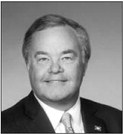Fiscal Session begins Wednesday

Fiscal Session begins Wednesday
State Capitol Week in Review From Senator Keith Ingram
LITTLE ROCK – The conclusion of the three-day special session on Medicaid sets the stage for a dramatic vote in the fiscal legislative session that begins April 13.
The fiscal session has been scheduled since last year.
The legislature meets every year, but in even-numbered years such as 2016 it meets in fiscal session.
That means it only considers budget bills to authorize spending for state agencies.
The governor called a special session to meet the week before the fiscal session, with only one topic on the agenda – for the legislature to consider a bill to extend Medicaid coverage to adults with incomes of up to 138 percent of the federal poverty level.
Rather than simply adding them to traditional Medicaid rolls, Arkansas developed a unique model of implementing the federal law by helping low-income families pay for private health insurance.
Arkansas first implemented a version of the Medicaid coverage in 2013, in response to changes in federal law that overhauled health insurance systems. Federal law requires everyone to purchase health insurance, and people who do not get it will be fined when they pay their taxes. The Arkansas implementation of the law helps low-income families pay for their required insurance.
The vote in the Senate was 25-to-10 in favor of the health insurance bill. In the House of Representatives it was 70-to-30.
Debate in the Senate was lengthy and heartfelt.
Arguments for and against the bill centered on its budget impact, and its potential effect on the financial status of rural hospitals.
The bill creates the Arkansas Works program, and a simple 51 percent majority was sufficient for passage.
In the fiscal session the legislature will consider a funding bill for the Medicaid program that requires 75 percent majorities in each chamber for passage. In the House that is 75 votes and in the Senate it is 27 votes. There are 35 members in the Senate.
The program provides coverage for about 267,000 Arkansas residents. The changes passed during the special session will require them to become more responsible for their personal health decisions, and to become more active in looking for work or educating themselves for better jobs.
Recipients who have jobs will have to get health insurance through their employers, rather than through the government exchange, if employer-sponsored health coverage is available. This provision addresses concerns that Arkansas Works may compete with private businesses that offer their workers health coverage. Legislators said they wanted to expand employer sponsored insurance, not hinder it.
Recipients who earn more than the federal poverty level will be required to pay for premiums. The amount of the premium cannot exceed 2 percent of their income.
Revenue Report March was the ninth month in state Fiscal Year 2016.
For the year to date, net general revenue has been $3.8 billion, which exceeds the same period last year by 3.3 percent, or $123 million.
The increase in revenue indicates that the Arkansas economy is growing. The total amount of net general revenue is above what was forecast by the state’s economic experts, by almost $73 million.



Share